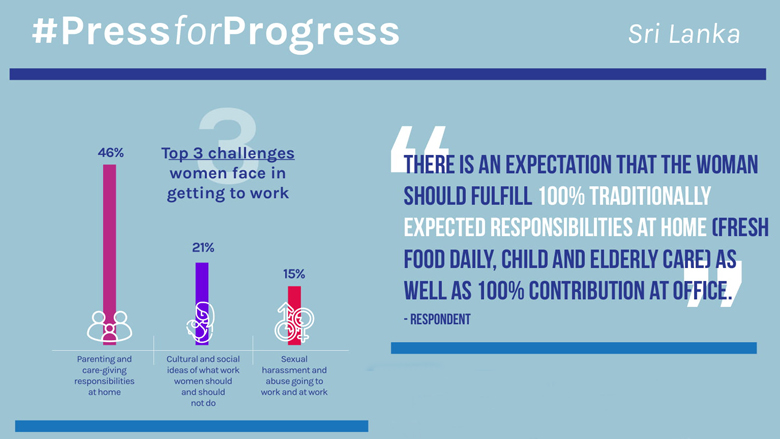In March this year, as part of the International Women’s Day #PressForProgress campaign, the World Bank office in Sri Lanka invited expression of views of Sri Lankans on priorities and opportunities to improve Female Labour Force Participation (FLFP) in Sri Lanka. Among other things, the survey* was designed to help us identify what Sri Lankans think are the main challenges keeping women out of the workplace; including their views on tangible steps to be taken to support women to gain paid employment.
In a blog that announced the survey and the Who’s Your Role Model? photo competition, Idah Pswarayi-Riddihough, Country Director for Sri Lanka and the Maldives, pointed out that Sri Lanka’s prosperity depends on its women joining the workforce, particularly as the country is aging fast - ‘Sri Lanka is getting older before getting rich. Without an adequate labour force, the country cannot be competitive, hence its ability to deliver basic services and generate revenue to support this service delivery would be hampered.’
We are pleased with the number of responses; though we would have loved more. Of the 239 respondents, 169 were women and 69 were men, and most of them between the ages of 25 to 35 years of age, and many being graduates or post-graduates.
When asked what are the top 3 challenges women faced in getting to work, 46% of the respondents identified parenting and caregiving responsibilities, followed by social/cultural norms (21%), and sexual harassment in the workplace (15%).
Men and women need to share responsibilities
“[There is an] expectation that the woman should fulfil 100% traditionally expected responsibilities at home (fresh food daily, child and elderly care) as well as 100% contribution at office,” one respondent said.
So, although both men and women became parents, it was assumed women would be the primary caregivers. “I have friends (female) who were asked in job interviews about the age they are going to get married and how many children she will be bearing,” said one respondent.
For those who persevere and continue to work, many face serious challenges. Respondents identified issues with juggling responsibilities at home and work (89%), difficulty with working long hours or staying overtime (73%) and difficulty finding childcare (79%) as being among the biggest challenges. One respondent said that inflexible workplace support systems and policies meant that women with babies or young children struggled to re-enter the work force after childbirth.
When asked how men and women could balance marriage and professional life, an overwhelming majority said men and women should equally share family responsibilities so that both spouses can contribute to the family income. More than 85% of the respondents, believe that sharing the family responsibilities at home was essential if women are to get back to work.
But core to this balanced sharing is the need to change attitudes at the family level. There is a need to promote “the concept of fatherhood and sharing gender roles at home.” Practical measures must underpin this attitude shift; such as flexible hours to help parents who need to balance both work and child care, said respondents, highlighting policies that supported working remotely and the provision of reliable child care facilities at the work place.

